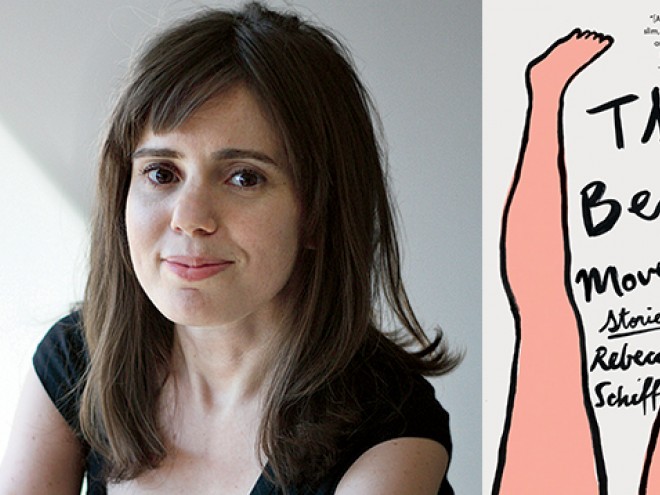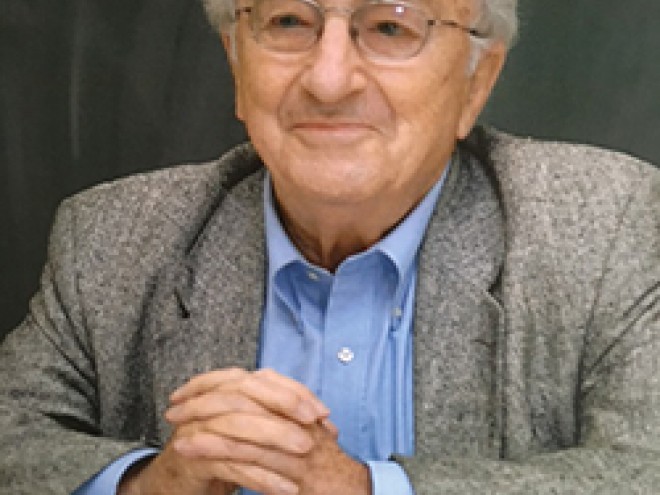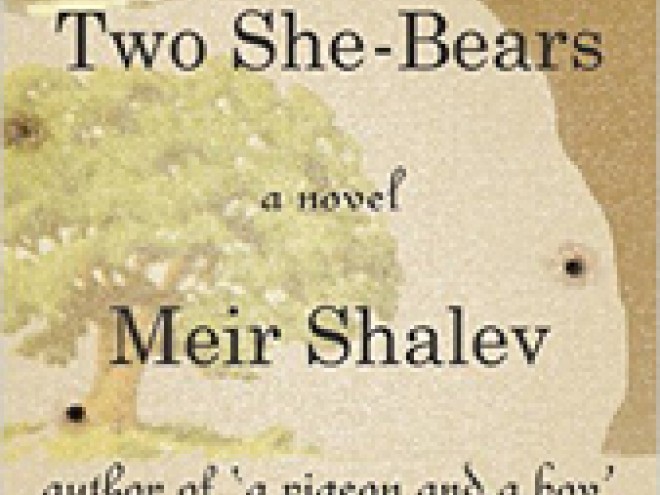Posted by Nat Bernstein
 Image: Edel Rodriguez, from Fascinating: The Life of Leonard Nimoy
Image: Edel Rodriguez, from Fascinating: The Life of Leonard Nimoy
Each year produces a fresh crop of fiction, nonfiction, poetry, and memoir addressing the Jewish High Holidays and the themes they embody: reflection on the past, forgiveness and reconciliation, spiritual cleanse and personal redemption, and transitioning into a new phase of life — both as an individual and as a community. Building on our recommendations from previous years, here are ten recommendations for the first ten days of 5777.
 Fascinating: The Life of Leonard Nimoy
Fascinating: The Life of Leonard Nimoy
Even diehard Trekkies might not know the full extent of the Vulcan Salute’s Jewish origins, but Richard Michelson’s new children’s biography of Leonard Nimoy takes young readers straight to the source. Edel Rodriguez’s glowing illustrations of Cohanim with their hands raised during Rosh Hashanah services at the Boston shul eight-year-old “Lenny” attended with his father depict the images Nimoy would conjure from his childhood memories when he came up with Mr. Spock’s iconic gesture and greeting, “Live long and prosper.”
 Among the Living: A Novel
Among the Living: A Novel
The protagonist of Jonathan Rabb’s novel, a young man named Yitzhak Goldah, survives the Holocaust and lands in Savannah, Georgia, where cousins and their Conservative Jewish community welcome him with open arms. But Yitzhak’s discomfort among them becomes mutual when he courts a widow belonging to the neighboring Reform temple, and tensions between the two fractious congregations come to a head over tashlich services held on the same beach. Things get even more complicated for Yitzhak from there, but that’s all I’ll give away here!
 White Walls: A Memoir About Motherhood, Daughterhood, and the Mess in Between
White Walls: A Memoir About Motherhood, Daughterhood, and the Mess in Between
Some of the most pivotal moments of Judy Batalion’s memoir occur on the Jewish High Holidays: she invites the man who would become her husband to her apartment for the first time for a Rosh Hashanah dinner with friends; she meets his parents ten days later, ending Yom Kippur in their Hampstead home, where Judy discovers that her bashert’s mother, too, is a hoarder much like her own — a moment she recalls years later to the day, returning home from services with her husband and daughter as a family.
 Rendezvous with God: Revealing the Meaning of Jewish Holidays and Their Mysterious Rituals
Rendezvous with God: Revealing the Meaning of Jewish Holidays and Their Mysterious Rituals
Why do we celebrate Rosh Hashanah? Why does it fall at such an awkward time on the calendar, and how do we interpret its definition in Leviticus as a remembrance of of the shofar blowing, zikhron truah, as the Jewish New Year? Why are we meant to observe Creation’s anniversary in a mood of “fear and trembling,” and could it be that Yom Kippur was intended as a joyous celebration? Where did the Kol Nidre and Ne’ila services come from, with no parallel customs for any other holiday? Rabbi Nathan Laufer addresses these and other questions in clear, text-based explanations for readers of all backgrounds.
 Murder, Inc. and the Moral Life: Gangsters and Gangbusters in La Guardia’s New York
Murder, Inc. and the Moral Life: Gangsters and Gangbusters in La Guardia’s New York
Reading Robert Weldon Whalen’s study of “real gangsters and reel gangsters” exposes how American popular culture has been — and continues to be — influenced by the 1940 and 1940 series of trials prosecuting members of Abe Reles’s Brownsville gang for murder, torture, and essentially any “illegal activity from which a revenue could be derived:” car theft, burglary, assault, robbery, fencing stolen goods, drug trade… The hearings and their outcome sparked a fascination with organized crime and its arbiters as a gritty but glorified symbol of moral evil, the ethical consequences and imprint of which Whalen explores chapter by chapter in this academic by thoroughly engaging read.
 Good on Paper: A Novel
Good on Paper: A Novel
Rachel Cantor’s second book is the first novel she ever wrote, and a little less zany than the first one published — but every bit as steeped in Jewish history and ideas: our hero Shira Greene’s love interest is an ordained rabbi who runs the local independent bookstore and a failing literary magazine called Gilgul, named after the Kabbalistic concept of a person’s soul reborn in another body. But the strongest Jewish quality of the story, as Cantor highlighted in an interview about the novel, is the centrality of forgiveness in Shira’s development: “My understanding of the Jewish concept of teshuvah is about returning to one’s innocent self, although some call it repentance. Shira is going through such a journey. She must be courageous and allow people to be a part of her life again.”
 One of These Things First: A Memoir
One of These Things First: A Memoir
“Oh Brooklyn, my Brooklyn. Life could offer no richer lesson than to simply grow up there.” Steven Gaines’s memoir begins on a purposeful route through his grandparents’ lingerie shop, escaping the supervision of the sales ladies in his charge to slip out the back door and attempt to kill himself at fifteen years old. Admitted to the famed Payne Whitney clinic, Steven delivers a note confessing “I THINK I AM A HOMOSEXUAL” to a young resident and begins treatment to “cure” himself of his sexual orientation. The story ends with a difficult apology delivered fifty years later, which Steven struggles to accept, knowing that even his forgiveness will not be enough to enable the person seeking it to forgive himself.
 Nine Essential Things I’ve Learned About Life
Nine Essential Things I’ve Learned About Life
Rabbi Harold S. Kushner’s succinct reflections on over half a century of Jewish faith, practice, and leadership is indeed an “essential” read for Rosh Hashanah and Yom Kippur, with lessons including “Leave Room for Doubt and Anger in Your Religious Outlook” and “Religion Is What You Do, Not What You Believe,” concluding with “A Love Letter to a World That May or May Not Deserve It.” Kushner’s chapter on forgiveness — as “a Favor You Do Yourself” — draws upon The Merchant of Venice, The Count of Monte Cristo, Joseph’s reunion with his brothers in Egypt, King David’s relationship with his wife Michal, the movements led by Nelson Mandela and Dr. Martin Luther King, and personal anecdotes from Kushner’s life and pastoral career around the High Holidays.
 Casting Lots: Creating a Family in a Beautiful, Broken World
Casting Lots: Creating a Family in a Beautiful, Broken World
“Throughout my life and then eventually through my Jewish education that, frankly, only started in rabbinical school, I had alternately rebuked and implored God, despaired of and celebrated tradition, lorded my own righteousness over some teachings and stood in humility and even shame before the vastness and depth of the tradition. But now, my sister, my new son, the caregivers, and the children in this orphanage with me comprised a microcosm of love, tragedy, hope, apathy, brokenness, and healing — the shattered and the whole — the promise of Mount Sinai,” Susan Silverman shares at the moment she first meets her son Adar. “And in it I wasn’t God’s judge or God’s bitch. I was God’s partner.” Underlying Susan Silverman’s story of raising a family of biological and adopted children is a continuous theme of renewal and fulfillment, rooted in reflections on Jewish values, rituals, and proverbs. This memoir is a great selection for readers looking for an accessible, feel-good meditation on Jewish faith and spirituality for the High Holidays — just make sure to keep a pack of tissues handy.
 Good People: A Novel
Good People: A Novel
Israeli novelist Nir Baram’s Good People follows two characters at the time of World War II, a German in Poland and the daughter half-Jewish daughter of intellectuals in Russia, each working for their country’s government and intent on survival and success at any cost — even betraying those who saved them. Only in encountering each other, recognizing a similar genius between them, will they repent, but what does redemption look like in a time when nations and individuals alike seek only power and the destruction of their enemies?
Jewish Book Council wishes all our readers a Shana Tovah! Read a JBC Executive Director Naomi Firestone-Teeter’s Rosh Hashanah letter from the JBC!
Related Content:



